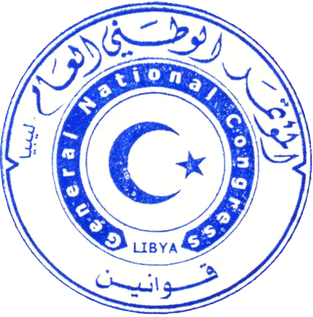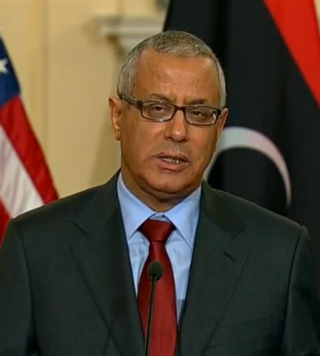Related Research Articles

Pierre Amine Gemayel,also spelled Jmayyel,Jemayyel or al-Jumayyil,was a Lebanese political leader. A Maronite Catholic,he is remembered as the founder of the Kataeb Party,as a parliamentary powerbroker,and as the father of Bachir Gemayel and Amine Gemayel,both of whom were elected to the presidency of the republic in his lifetime.

Baghdadi Ali Mahmudi is a Libyan politician who was Secretary of the General People's Committee of Libya from 5 March 2006 to as late as 1 September 2011,when he acknowledged the collapse of the GPCO and the ascendance of the National Transitional Council as a result of the Libyan Civil War. He has a medical degree,specialising in obstetrics and gynecology,and had served as Deputy Prime Minister to Prime Minister Shukri Ghanem since 2003 at the time he was appointed to replace him. He was a part of Gaddafi's inner circle at least prior to his escape in mid-2011. He was arrested in Tunisia for illegal border entry and jailed for six months,although this was later overruled on appeal,however a Tunisian court decided to extradite Mahmoudi to Libya under a request from Libya's Transitional Council.

The National Front for the Salvation of Libya (NFSL) was a political opposition group active during the rule of the Gaddafi regime in Libya. It was formed in 1981 and called for major liberalising reforms such as democratic elections,a free press,and the separation of powers. During the 1980s,it pursued a campaign of armed opposition to the Gaddafi regime and made several coup attempts,the most notable being its 1984 armed assault on Gaddafi's Bab al-Azizia compound in Tripoli. After the failure of this and several other coup attempts the group largely abandoned militancy,and instead used peaceful tactics to promote reform in Libya;in 2005,the NFSL joined with six other groups to form the National Conference for the Libyan Opposition.

Ali Abdussalam Tarhouni is a Libyan economist and politician. Tarhouni served as the minister for oil and finance on the National Transitional Council,the provisional governing authority in Libya,from 23 March to 22 November 2011. He acted in the capacity of interim prime minister of Libya during the departure of outgoing incumbent Mahmoud Jibril from 23 October 2011 until Abdurrahim El-Keib was formally named to succeed Jibril on 31 October.

Wael Nader Al-Halqi is a Syrian politician who was Prime Minister of Syria from 2012 to 2016. Previously he was Minister of Health from 2011 to 2012. He was appointed as Prime Minister on 9 August 2012.

Mustafa A. G. Abushagur is a Libyan politician,professor of electrical engineering,university president and entrepreneur. He served as interim Deputy Prime Minister of Libya from 22 November 2011 to 14 November 2012 in Abdurrahim El-Keib's cabinet and was briefly elected to succeed El-Keib as Prime Minister in 2012,before failing to receive congressional approval for his cabinet nominees and being removed from office.
Abdulrahman Ben Yezza is a Libyan businessman and politician who is the Oil Minister in the government of Abdurrahim El-Keib. Prior to the 2011 Libyan Civil War,Ben Yezza served as "chairman of the operator's management committee" for Italian oil company Eni. He also worked for Libya's National Oil Corporation during Libya's governance by Muammar Gaddafi,but he quit the company voluntarily due to reported differences with its then-leader Shokri Ghanem,a member of Gaddafi's inner circle. In 2014 the Libyan government has named Abdulrahman Ben Yezza as chairman of the Libyan Investment Authority (LIA). He temporarily replaced AmbdulMagid Breish who had to step out pending investigation into his role in the Gaddafi administration.

Following the end of the First Libyan Civil War,which overthrew Muammar Gaddafi,there was violence involving various militias and the new state security forces. This violence has escalated into the Second Libyan Civil War (2014–2020).

The General National Congress or General National Council was the legislative authority of Libya for two years following the end of the First Libyan Civil War. It was elected by popular vote on 7 July 2012,and took power from the National Transitional Council on 8 August.

Ali Zeidan is a former Prime Minister of Libya. He was appointed by the General National Congress on 14 October 2012,and took office on 14 November after Congress approved his cabinet nominees. Prior to the Libyan Civil War,Zeidan was a Geneva-based human rights lawyer and according to the BBC,he is considered by some local observers as a strong-minded liberal. He was ousted by the parliament committee and fled from Libya on 14 March 2014. However,he told the press conference in Rabat,Morocco,that the ousting was invalid.

The cabinet was selected by Prime Minister Ali Zeidan on 30 October 2012 and was approved by the General National Congress on 31 October 2012 together with approving Zidan as Libya's first post-war Prime Minister. The cabinet is composed of the following ministers:Two women were selected to cabinet,and select ministries went to political independents who were not associated with any party.

Mohamed Abdelaziz is a Libyan politician who served as the foreign minister of and chairman of the Arab League council of ministers from January 2013 to August 2014.
Abdulbari Al Arusi is a Libyan engineer and politician who served as oil and gas minister of Libya from 14 November 2012 until 22 January 2014.
Abdussalam Al Qadi is a Libyan politician who served as the third deputy prime minister between November 2012 and 29 August 2014.
Salah Bashir Marghani is a Libyan jurist,and the former justice minister in the post-civil war government of Libya. He was part of Prime Minister Ali Zeidan's initial cabinet and took office on 14 November 2012.
Mohammed Nasser Ahmed is a Yemeni major general,who was the defense minister of Yemen between 2006 and 2014.

Abdullah al-Theni is a Libyan politician who became prime minister of the House of Representatives of Libya on 11 March 2014,when he took over in an interim capacity after the dismissal of Ali Zeidan. He was previously the defence minister in the government of Zeidan.

Fayez Mustafa al-Sarraj is a Libyan politician who served as the Chairman of the Presidential Council of Libya and Head of Government of the Government of National Accord from 2016 to 2021,which was formed on 17 December 2015 under the Libyan Political Agreement. He has been a member of the Parliament of Tripoli.

Fathi Ali Abdul Salam Bashagha,known simply as "Fathi Bashagha" or occasionally Fathi Ali Pasha,is a Libyan politician and the interim prime minister of Government of National Stability. He served as Minister of Interior from 2018 to 2021.

Abdul Hamid al-Dbeibeh is a Libyan politician and businessman who is the prime minister of Libya under the Government of National Unity (GNU) in Tripoli. Dbeibeh was appointed on 15 February 2021 through the Libyan Political Dialogue Forum,and he was expected to hold the office until elections on 24 December 2021,which were later postponed.
References
- 1 2 3 4 "Curriculum Vitae of Ali Zeidan's government ministers". Libya Herald . 3 November 2012. Retrieved 8 February 2013.
- ↑ Whitaker's Shorts 2015: International. Bloomsbury Publishing. 20 November 2014. p. 678. ISBN 978-1-4729-1484-2 . Retrieved 19 March 2015.
- ↑ "Events in November 2012". Rulers. Retrieved 8 February 2013.
- 1 2 "Deputy Prime Minister escapes assassination attempt". Opemam. 29 January 2014. Retrieved 19 March 2015.
- ↑ George Grant (26 November 2012). "Government now says deputy ministers to stay in place until replacements appointed". Libya Herald. Retrieved 8 February 2013.
- ↑ "Libya government resigns to allow new cabinet". Al Jazeera English. 29 August 2014. Retrieved 28 August 2014.